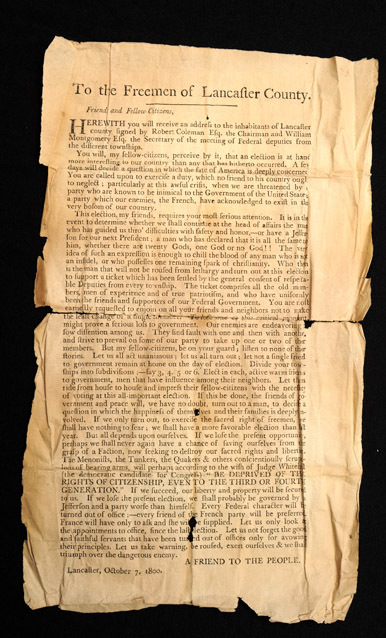
In the last decades of the eighteenth-century, the nascent sect known as the River Brethren published a confession of faith. Among other claims in the confession, these Christians concluded that “God rules all nature, and has men who rule nature, and this is for the benefit of the children of God . . . therefore [we] pray for them, that they may perform their duty loyally, so that the children of God under them may lead a quiet and blessed life. But we shall not use them for power . . .”
In other words, the earliest River Brethren refused to vote.
Apparently, this wasn’t a sentiment shared by all Lancaster County Anabaptists in the early days of the new Republic. As the election of 1800 drew near, propagandists for the conservative Federalist cause (and incumbent candidate John Adams) feared the liberal politics of the Democratic-Republican candidate Thomas Jefferson, and turned to Lancaster County’s “plain sects” for help in rebuffing this would-be leader.
This is according to a broadside — a flier-like document printed for immediate use in the late eighteenth century and never expected to be preserved — recently uncovered in a box of donations to the Lancaster Mennonite Historical Society.
Here’s more information on the find, courtesy of LancasterOnline:
The second broadside is dated Oct. 7, 1800, and is signed by “a friend to the people,” though it lists noted local politicians Robert Coleman and William Montgomery as its source.
Although written in the flowery language of the day, its tone isn’t too far afield from modern political rhetoric as it charges readers to defeat a candidate “known to be inimical to the Government of the United States.”
The coming election, it states, will “determine whether we shall continue at the head of affairs the man who has guided us thro’ difficulties with safety and honor, — or have a Jefferson for our next President; a man who has declared that it is all the same to him, whether there are twenty Gods, one God or no God!! The very idea of such an expression is enough to chill the blood of any man who is not an infidel, or who possesses one remaining spark of christianity.”
It appeals directly to the county’s Plain sects, many of whom did not usually vote, and continues: “If we lose the present election, we shall probably be governed by a Jefferson and a party worse than himself. … Let us take warning, be roused, exert ourselves & we shall triumph over the dangerous enemy.”
The effort ultimately failed. Jefferson won the election with more than 61 percent of the popular vote.
Read the whole article here.
You can learn more about this document, read its full text, and (hopefully) glean a bit more about the political practices of eighteenth-century Lancaster County Anabaptists in the October issue of Lancaster Mennonite Historical Society‘s Pennsylvania Mennonite Heritage magazine.

I find it most interesting now that many evangelicals extol the virtues of Thomas Jefferson–since he eschewed centralized government. I wonder if Jefferson would so favored were they to know more about his religious views.